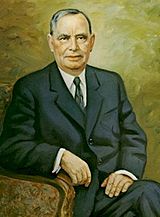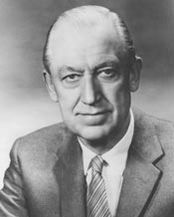81st United States Congress
This article does not cite any sources. (November 2019) |
| 81st United States Congress | |
|---|---|
80th ← → 82nd | |
 United States Capitol (1956) | |
January 3, 1949 – January 3, 1951 | |
| Members | 96 senators 435 representatives 3 non-voting delegates |
| Senate Majority | Democratic |
| Senate President | Vacant (until January 20, 1949) Alben W. Barkley (D) (from January 20, 1949) |
| House Majority | Democratic |
| House Speaker | Sam Rayburn (D) |
| Sessions | |
| 1st: January 3, 1949 – October 19, 1949 2nd: January 3, 1950 – January 2, 1951 | |
The 81st United States Congress was a meeting of the legislative branch of the United States federal government, composed of the United States Senate and the United States House of Representatives. It met in Washington, D.C. from January 3, 1949, to January 3, 1951, during the fifth and sixth years of Harry S. Truman's presidency.
The apportionment of seats in this House of Representatives was based on the Sixteenth Census of the United States in 1940.
The Democrats won back the majority in both chambers, and with the election of President Harry S. Truman to his own full term in office, this gave the Democrats an overall federal government trifecta.
Major events[]
- January 20, 1949: President Harry S. Truman began his second (only full) term.
- August 16, 1949: Office of Chairman of the Joint Chiefs of Staff created
- January 21, 1950: Accused communist spy Alger Hiss was convicted of perjury
- January 31, 1950: President Truman ordered the development of the hydrogen bomb, in response to the detonation of the Soviet Union's first atomic bomb in 1949
- June 27, 1950: Korean War: President Truman ordered American military forces to aid in the defense of South Korea
Major legislation[]

- June 20, 1949: Central Intelligence Agency Act, ch. 227, 63 Stat. 208, 50 U.S.C. § 403a
- October 25, 1949: , ch. 722, Pub.L. 81–380, 63 Stat. 898
- October 26, 1949: Fair Labor Standards Amendment, ch. 736, Pub.L. 81–393, 63 Stat. 910, 29 U.S.C. ch. 8
- October 31, 1949: Agricultural Act of 1949, ch. 792, 63 Stat. 1051
- May 5, 1950: Uniform Code of Military Justice, ch. 169, 64 Stat. 109
- May 10, 1950: National Science Foundation Act, ch. 171, Pub.L. 81–507, 64 Stat. 149, 42 U.S.C. ch. 16
- August 15, 1950: , Pub.L. 81–692, 64 Stat. 443 (including , which established the National Institute of Neurological Diseases and Blindness)
- September 8, 1950: Defense Production Act of 1950, Pub.L. 81–774, 64 Stat. 798
- September 12, 1950: , ch. 946, 64 Stat. 832
- September 23, 1950: McCarran Internal Security Act (including Subversive Activities Control Act of 1950), ch. 1024, 64 Stat. 987, 50 U.S.C. § 781
- September 30, 1950: , ch. 1123, 64 Stat. 1098
- December 29, 1950: Celler–Kefauver Act (Anti-Merger Act), ch. 1184, 64 Stat. 1125
- January 12, 1951: , ch. 1228, 64 Stat. 1245 (codified in 50 U.S.C. App., here [1])
Treaties[]
- July 21, 1949: North Atlantic Treaty ratified, establishing the North Atlantic Treaty Organization (NATO)
Hearings[]

- May 11, 1950: Kefauver Committee hearings into U.S. organized crime began
Party summary[]
Senate[]
| Party (shading shows control) |
Total | Vacant | ||
|---|---|---|---|---|
| Democratic (D) |
Republican (R) | |||
| End of previous congress | 45 | 51 | 96 | 0 |
| Begin | 54 | 42 | 96 | 0 |
| End | 53 | 43 | ||
| Final voting share | 55.2% | 44.8% | ||
| Beginning of next congress | 49 | 47 | 96 | 0 |
House of Representatives[]

| House seats by party holding plurality in state | |
|---|---|
80+ to 100% Democratic | 80+ to 100% Republican |
60+ to 80% Democratic | 60+ to 80% Republican |
Up to 60% Democratic | Up to 60% Republican |
| Party (shading shows control) |
Total | Vacant | |||||
|---|---|---|---|---|---|---|---|
| American Labor (AL) |
Democratic (D) | Liberal (Lib) | Republican (R) | Independent (I) |
|||
| End of previous congress | 2 | 186 | 0 | 242 | 0 | 430 | 5 |
| Begin | 1 | 262 | 0 | 171 | 0 | 434 | 1 |
| End | 259 | 1 | 168 | 429 | 6 | ||
| Final voting share | 0.2% | 60.4% | 0.2% | 39.2% | 0.0% | ||
| Beginning of next congress | 0 | 235 | 0 | 199 | 1 | 435 | 0 |
Leadership[]
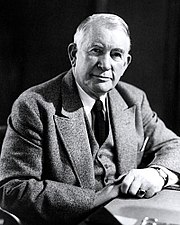
Alben W. Barkley

Kenneth McKellar

Sam Rayburn
Senate[]
- President: Vacant until January 20, 1949
- Alben W. Barkley (D), from January 20, 1949
- President pro tempore: Kenneth McKellar (D)
Majority (Democratic) leadership[]
- Majority Leader: Scott W. Lucas
- Majority Whip: Francis J. Myers
- Democratic Caucus Secretary: Brien McMahon
- Policy Committee Chairman: Scott W. Lucas
Minority (Republican) leadership[]
- Minority Leader: Kenneth S. Wherry
- Minority Whip: Leverett Saltonstall
- Republican Conference Chairman: Eugene Millikin
- Republican Conference Secretary: Milton Young
- National Senatorial Committee Chair: Styles Bridges
- Policy Committee Chairman: Robert A. Taft
House of Representatives[]
- Speaker: Sam Rayburn (D)
Majority (Democratic) leadership[]
- Majority Leader: John W. McCormack
- Majority Whip: Percy Priest
- Democratic Caucus Chairman: Francis E. Walter
- Democratic Caucus Secretary: Chase G. Woodhouse
- Democratic Campaign Committee Chairman: Michael J. Kirwan
Minority (Republican) leadership[]
- Minority Leader: Joseph W. Martin Jr.
- Minority Whip: Leslie C. Arends
- Republican Conference Chairman: Roy O. Woodruff
- Policy Committee Chairman: Joseph W. Martin Jr.
- Republican Campaign Committee Chairman: Leonard W. Hall
Caucuses[]
- House Democratic Caucus
- Senate Democratic Caucus
Members[]
Senate[]
Senators are popularly elected statewide every two years, with one-third beginning new six-year terms with each Congress. Senators are ordered first by state, and then by seniority. Preceding the names in the list below are Senate class numbers, which indicate the cycle of their election, In this Congress, Class 3 meant their term ended with this Congress, requiring reelection in 1950; Class 1 meant their term began in the last Congress, requiring reelection in 1952; and Class 2 meant their term began in this Congress, requiring reelection in 1954.
Alabama[]
Arizona[]
Arkansas[]
California[]
Colorado[]
Connecticut[]
Delaware[]
Florida[]
Georgia[]
Idaho[]
Illinois[]
Indiana[]
Iowa[]
Kansas[]
Kentucky[]
Louisiana[]
Maine[]
Maryland[]
Massachusetts[]
Michigan[]
Minnesota[]
Mississippi[]
Missouri[]
Montana[]
|
Nebraska[]
Nevada[]
New Hampshire[]
New Jersey[]
New Mexico[]
New York[]
North Carolina[]
North Dakota[]
Ohio[]
Oklahoma[]
Oregon[]
Pennsylvania[]
Rhode Island[]
South Carolina[]
South Dakota[]
Tennessee[]
Texas[]
Utah[]
Vermont[]
Virginia[]
Washington[]
West Virginia[]
Wisconsin[]
Wyoming[]
|
 Senators' party membership by state at the opening of the 81st Congress in January 1949 2 Democrats 1 Democrat and 1 Republican 2 Republicans |
Senate majority leaders 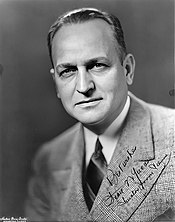 Democratic Leader Scott W. Lucas 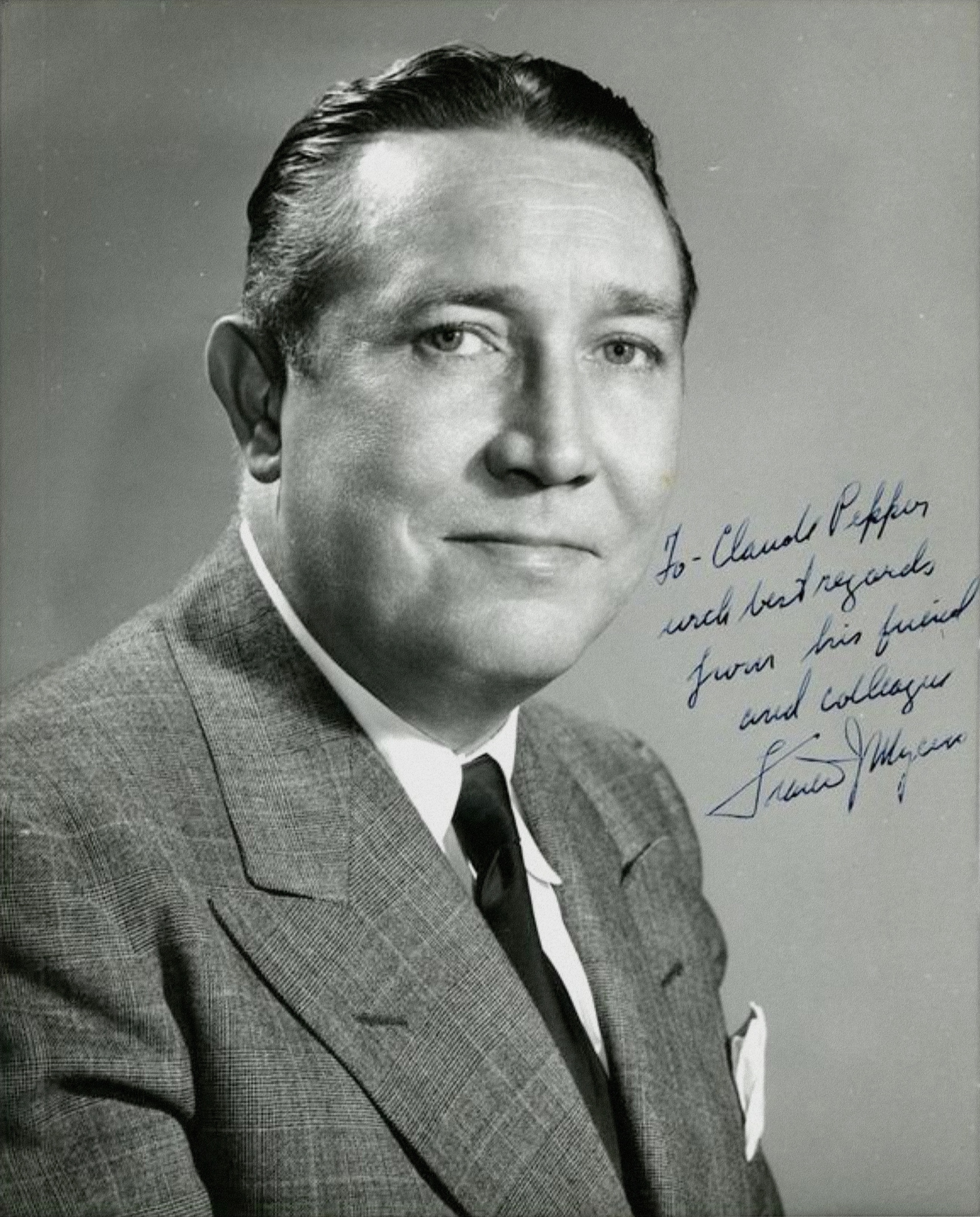 Democratic Whip Francis J. Myers Senate minority leaders  Republican Leader Kenneth S. Wherry 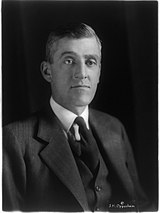 Republican Whip Leverett Saltonstall
|
House of Representatives[]
Alabama[]
Arizona[]Arkansas[]
California[]
Colorado[]Connecticut[]
Delaware[]
Florida[]
Georgia[]
Idaho[]Illinois[]
Indiana[]
Iowa[]
Kansas[]
Kentucky[]
Louisiana[]
Maine[]Maryland[]
Massachusetts[]
Michigan[]
Minnesota[]
Mississippi[]
Missouri[]
Montana[]
Nebraska[]
Nevada[]
New Hampshire[] |
New Jersey[]
New Mexico[]
New York[]
North Carolina[]
North Dakota[]Ohio[]
Oklahoma[]
Oregon[]Pennsylvania[]
Rhode Island[]South Carolina[]
South Dakota[]Tennessee[]
Texas[]
Utah[]Vermont[]
Virginia[]
Washington[]
West Virginia[]
Wisconsin[]
Wyoming[]
Non-voting members[]
|
House majority leaders Democratic Leader John W. McCormack Democratic Whip Percy Priest House minority leaders Republican Leader Joseph W. Martin Jr. Republican Whip Leslie C. Arends
|
Changes in membership[]
The count below reflects changes from the beginning of this Congress.
Senate[]
| State (class) |
Vacator | Reason for change | Successor | Date of successor's formal installation[a] |
|---|---|---|---|---|
| Kentucky (3) |
Alben W. Barkley (D) | Incumbent resigned January 19, 1949, to become U.S. Vice President. Successor appointed January 20, 1949, to finish the term. |
Garrett Withers (D) | January 20, 1949 |
| North Carolina (2) |
J. Melville Broughton (D) | Incumbent died March 6, 1949. Successor appointed March 29, 1949, to continue the term. |
Frank Porter Graham (D) | March 29, 1949 |
| New York (3) |
Robert F. Wagner (D) | Incumbent resigned June 28, 1949, due to ill health. Successor appointed July 7, 1949, to continue the term. |
John Foster Dulles (R) | July 7, 1949 |
| Rhode Island (1) |
J. Howard McGrath (D) | Incumbent resigned August 23, 1949, to become U.S. Attorney General. Successor appointed to continue the term. |
Edward L. Leahy (D) | August 24, 1949 |
| Idaho (2) |
Bert H. Miller (D) | Incumbent died October 8, 1949. Successor appointed to continue the term. Successor later elected November 7, 1950. |
Henry Dworshak (R) | October 14, 1949 |
| Kansas (3) |
Clyde M. Reed (R) | Incumbent died November 8, 1949. Successor appointed to continue the term. |
Harry Darby (R) | December 2, 1949 |
| New York (3) |
John Foster Dulles (R) | Interim appointee lost November 8, 1949, election to finish the term. Successor elected November 8, 1949. |
Herbert H. Lehman (D) | November 9, 1949 |
| Connecticut (1) |
Raymond E. Baldwin (R) | Incumbent resigned December 16, 1949. Successor appointed to continue the term. Successor later elected November 7, 1950. |
William Benton (D) | December 17, 1949 |
| Kentucky (3) |
Garrett Withers (D) | Interim appointee resigned November 26, 1950, to trigger special election. Successor elected November 7, 1950. |
Earle Clements (D) | November 27, 1950 |
| North Carolina (2) |
Frank Porter Graham (D) | Interim appointee lost November 7, 1950, election to finish the term. Successor elected November 7, 1950. |
Willis Smith (D) | November 27, 1950 |
| Kansas (3) |
Harry Darby (R) | Interim appointee retired November 28, 1950, when successor elected. Successor elected November 29, 1950. |
Frank Carlson (R) | November 29, 1950 |
| California (3) |
Sheridan Downey (D) | Incumbent resigned November 30, 1950, due to ill health. Successor appointed to finish term, having already been elected to the next term. |
Richard Nixon (R) | December 1, 1950 |
| Rhode Island (1) |
Edward L. Leahy (D) | Interim appointee retired December 18, 1950, when successor elected. Successor elected December 19, 1950. |
John Pastore (D) | December 19, 1950 |
House of Representatives[]
| District | Vacator | Reason for change | Successor | Date of successor's formal installation[a] |
|---|---|---|---|---|
| New York 7th | Vacant | Rep. John J. Delaney died during previous congress | Louis B. Heller (D) | February 15, 1949 |
| New York 20th | Sol Bloom (D) | Died March 7, 1949. | Franklin Delano Roosevelt Jr. (Lib) | May 17, 1949 |
| New York 10th | Andrew Lawrence Somers (D) | Died April 6, 1949. | Edna F. Kelly (D) | November 8, 1949 |
| Pennsylvania 26th | Robert L. Coffey (D) | Died April 20, 1949. | John P. Saylor (R) | September 13, 1949 |
| California 5th | Richard J. Welch (R) | Died September 10, 1949. | John F. Shelley (D) | November 8, 1949 |
| Massachusetts 6th | George J. Bates (R) | Died November 1, 1949. | William H. Bates (R) | February 14, 1950 |
| Illinois 5th | Martin Gorski (D) | Died December 4, 1949. | Vacant | Not filled for the remainder of this term |
| New Jersey 7th | J. Parnell Thomas (R) | Resigned January 2, 1950, following conviction on charges of salary fraud. | William B. Widnall (R) | February 6, 1950 |
| Virginia 1st | S. Otis Bland (D) | Died February 16, 1950. | Edward J. Robeson Jr. (D) | May 2, 1950 |
| Illinois 13th | Ralph E. Church (R) | Died March 21, 1950. | Vacant | Not filled for the remainder of this term |
| Texas 18th | Eugene Worley (D) | Resigned April 3, 1950, to become associate judge of the United States Court of Customs and Patent Appeals. | Ben H. Guill (R) | May 6, 1950 |
| Michigan 16th | John Lesinski Sr. (D) | Died May 27, 1950. | Vacant | Not filled for the remainder of this term |
| North Dakota at-large | William Lemke (R) | Died May 30, 1950. | Vacant | Not filled for the remainder of this term |
| North Carolina 11th | Alfred L. Bulwinkle (D) | Died August 31, 1950. | Woodrow W. Jones (D) | November 7, 1950 |
| Kansas 3rd | Herbert Alton Meyer (R) | Died October 2, 1950. | Myron V. George (R) | November 7, 1950 |
| California 12th | Richard Nixon (R) | Resigned November 30, 1950, after being appointed to the U.S. Senate having already been elected. | Vacant | Not filled for the remainder of this term |
| Wyoming at-large | Frank A. Barrett (R) | Resigned December 31, 1950, after being elected Governor of Wyoming. | Vacant | Not filled for the remainder of this term |
Committees[]
Lists of committees and their party leaders, for members (House and Senate) of the committees and their assignments, go into the Official Congressional Directory at the bottom of the article and click on the link (2 links), in the directory after the pages of terms of service, you will see the committees of the Senate, House (Standing with Subcommittees, Select and Special) and Joint and after the committee pages, you will see the House/Senate committee assignments in the directory, on the committees section of the House and Senate in the Official Congressional Directory, the committee's members on the first row on the left side shows the chairman of the committee and on the right side shows the ranking member of the committee.
Senate[]
- Agriculture and Forestry (Chairman: Elmer Thomas; Ranking Member: George D. Aiken)
- Appropriations (Chairman: Kenneth McKellar; Ranking Member: Styles Bridges)
- Armed Services (Chairman: Millard E. Tydings; Ranking Member: Styles Bridges)
- Banking and Currency (Chairman: Burnet R. Maybank; Ranking Member: Charles W. Tobey)
- District of Columbia (Chairman: Matthew M. Neely; Ranking Member: John J. Williams)
- Expenditures in Executive Departments (Chairman: John L. McClellan; Ranking Member: Joseph R. McCarthy)
- Finance (Chairman: Walter F. George; Ranking Member: Eugene D. Millikin)
- Foreign Relations (Chairman: Tom Connally; Ranking Member: Arthur H. Vandenberg)
- Interior and Insular Affairs (Chairman: Joseph C. O'Mahoney; Ranking Member: Hugh Butler)
- Subcommittee on Internal Security
- Interstate and Foreign Commerce (Chairman: Edwin C. Johnson; Ranking Member: Charles W. Tobey)
- Judiciary (Chairman: Pat McCarran; Ranking Member: Alexander Wiley)
- Labor and Public Welfare (Chairman: Elbert D. Thomas; Ranking Member: Robert A. Taft)
- (Select)
- Post Office and Civil Service (Chairman: Frank Carlson; Ranking Member: Olin D. Johnston)
- Public Works (Chairman: Dennis Chavez; Ranking Member: William Langer)
- (Special)
- Rules and Administration (Chairman: Carl Hayden; Ranking Member: Kenneth S. Wherry)
- Small Business (Select)
- (Special)
- Whole
House of Representatives[]
- Agriculture (Chairman: Harold D. Cooley; Ranking Member: Clifford R. Hope)
- Appropriations (Chairman: Clarence Cannon; Ranking Member: John Taber)
- Armed Services (Chairman: Carl Vinson; Ranking Member: Dewey Jackson Short)
- Banking and Currency (Chairman: Brent Spence; Ranking Member: Jesse P. Wolcott)
- District of Columbia (Chairman: John L. McMillan; Ranking Member: George J. Bates)
- Education and Labor (Chairman: John Lesinski; Ranking Member: Samuel K. McConnell, Jr.)
- Expenditures in the Executive Departments (Chairman: William L. Dawson; Ranking Member: Clare E. Hoffman)
- Foreign Affairs (Chairman: John Kee; Ranking Member: Charles Aubrey Eaton)
- House Administration (Chairman: Mary Teresa Norton; Ranking Member: Karl M. LeCompte)
- (Select) (Chairman: Olin E. Teague)
- (Select) (Chairman: N/A)
- Interstate and Foreign Commerce (Chairman: Robert Crosser; Ranking Member: Charles A. Wolverton)
- Judiciary (Chairman: Emanuel Celler; Ranking: Earl C. Michener)
- (Select) (Chairman: Frank Buchanan)
- Merchant Marine and Fisheries (Chairman: S. Otis Bland; Ranking Member: Alvin F. Weichel)
- Post Office and Civil Service (Chairman: Tom J. Murray; Ranking Member: Edward H. Rees)
- Public Lands (Chairman: J. Hardin Peterson; Ranking Member: Richard J. Welch then Fred L. Crawford)
- Public Works (Chairman: William M. Whittington; Ranking Member: George Anthony Dondero)
- Rules (Chairman: Adolph J. Sabath; Ranking Member: Leo E. Allen)
- (Select) (Chairman: Wright Patman)
- Standards of Official Conduct
- Un-American Activities (Chairman: John S. Wood; Ranking Member: J. Parnell Thomas)
- Veterans' Affairs (Chairman: John E. Rankin; Ranking Member: Edith Nourse Rogers)
- Ways and Means (Chairman: Robert L. Doughton; Ranking Member: Daniel A. Reed)
- Whole
Joint committees[]
- Atomic Energy (Chairman: Sen. Brien McMahon; Vice Chairman: Rep. Carl T. Durham)
- Conditions of Indian Tribes (Special)
- (Chairman: Sen. Pat McCarran)
- Economic (Chairman: Sen. Joseph C. O'Mahoney; Vice Chairman: Rep. Edward J. Hart)
- (Chairman: Sen. James E. Murray; Vice Chairman: Rep. John Lesinski)
- The Library (Chairman: Sen. Theodore F. Green)
- (Chairman: Sen. Carl Hayden)
- Printing (Chairman: Sen. Carl Hayden; Vice Chairman: Rep. Mary Teresa Norton)
- Taxation (Chairman: Rep. Robert L. Doughton; Vice Chairman: Sen. Walter F. George)
Employees[]
Legislative branch agency directors[]
- Architect of the Capitol: David Lynn
- Attending Physician of the United States Congress: George Calver
- Comptroller General of the United States: Lindsay C. Warren
- Librarian of Congress: Luther H. Evans
- Public Printer of the United States: John J. Deviny
Senate[]
- Chaplain: Peter Marshall (Presbyterian), until January 26, 1949
- Frederick Brown Harris (Methodist), from February 3, 1949
- Parliamentarian:
- Secretary:
- Librarian:
- :
- :
- Sergeant at Arms:
House of Representatives[]
- Chaplain: James Shera Montgomery (Methodist), until January 3, 1950
- Bernard Braskamp (Presbyterian), from January 3, 1950
- Clerk: Ralph R. Roberts
- Doorkeeper: William Mosley "Fishbait" Miller
- Parliamentarian: Lewis Deschler
- Postmaster:
- Reading Clerks: (D) and (R)
- Sergeant at Arms:
See also[]
- United States elections, 1948 (elections leading to this Congress)
- 1948 United States presidential election
- United States Senate elections, 1948 and 1949
- United States House of Representatives elections, 1948
- United States elections, 1950 (elections during this Congress, leading to the next Congress)
- United States Senate elections, 1950
- United States House of Representatives elections, 1950
Notes[]
- ^ Jump up to: a b When seated or oath administered, not necessarily when service began.
External links[]
- House of Representatives Session Calendar for the 81st Congress (PDF). Archived from the original (PDF) on September 20, 2018. Retrieved June 6, 2016.
- Official Congressional Directory for the 81st Congress, 1st Session.
- Official Congressional Directory for the 81st Congress, 2nd Session.
- 81st United States Congress


